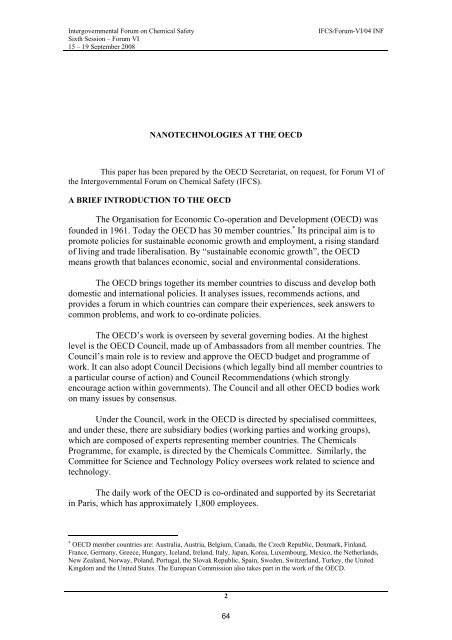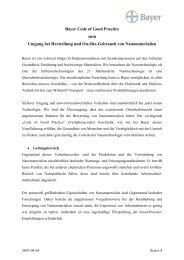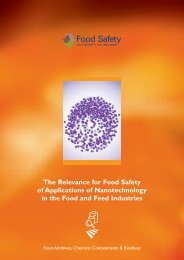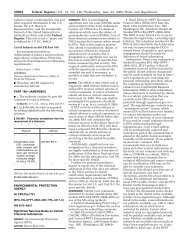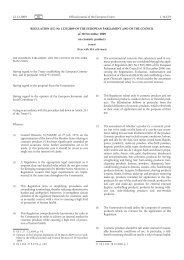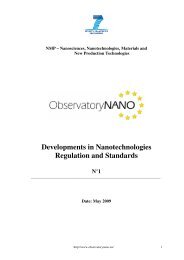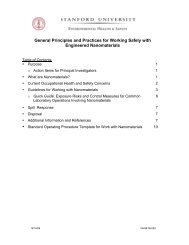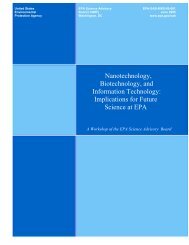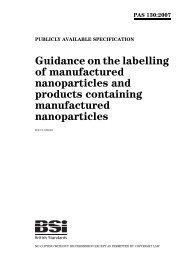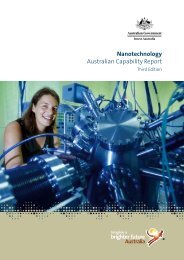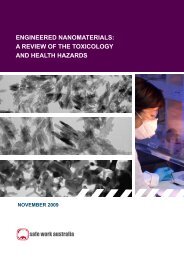Nanotechnology - Nanotech Regulatory Document Archive - Arizona ...
Nanotechnology - Nanotech Regulatory Document Archive - Arizona ...
Nanotechnology - Nanotech Regulatory Document Archive - Arizona ...
You also want an ePaper? Increase the reach of your titles
YUMPU automatically turns print PDFs into web optimized ePapers that Google loves.
Intergovernmental Forum on Chemical Safety<br />
Sixth Session – Forum VI<br />
15 – 19 September 2008<br />
NANOTECHNOLOGIES AT THE OECD<br />
2<br />
IFCS/Forum-VI/04 INF<br />
This paper has been prepared by the OECD Secretariat, on request, for Forum VI of<br />
the Intergovernmental Forum on Chemical Safety (IFCS).<br />
A BRIEF INTRODUCTION TO THE OECD<br />
The Organisation for Economic Co-operation and Development (OECD) was<br />
founded in 1961. Today the OECD has 30 member countries. ∗ Its principal aim is to<br />
promote policies for sustainable economic growth and employment, a rising standard<br />
of living and trade liberalisation. By “sustainable economic growth”, the OECD<br />
means growth that balances economic, social and environmental considerations.<br />
The OECD brings together its member countries to discuss and develop both<br />
domestic and international policies. It analyses issues, recommends actions, and<br />
provides a forum in which countries can compare their experiences, seek answers to<br />
common problems, and work to co-ordinate policies.<br />
The OECD’s work is overseen by several governing bodies. At the highest<br />
level is the OECD Council, made up of Ambassadors from all member countries. The<br />
Council’s main role is to review and approve the OECD budget and programme of<br />
work. It can also adopt Council Decisions (which legally bind all member countries to<br />
a particular course of action) and Council Recommendations (which strongly<br />
encourage action within governments). The Council and all other OECD bodies work<br />
on many issues by consensus.<br />
Under the Council, work in the OECD is directed by specialised committees,<br />
and under these, there are subsidiary bodies (working parties and working groups),<br />
which are composed of experts representing member countries. The Chemicals<br />
Programme, for example, is directed by the Chemicals Committee. Similarly, the<br />
Committee for Science and Technology Policy oversees work related to science and<br />
technology.<br />
The daily work of the OECD is co-ordinated and supported by its Secretariat<br />
in Paris, which has approximately 1,800 employees.<br />
∗ OECD member countries are: Australia, Austria, Belgium, Canada, the Czech Republic, Denmark, Finland,<br />
France, Germany, Greece, Hungary, Iceland, Ireland, Italy, Japan, Korea, Luxembourg, Mexico, the Netherlands,<br />
New Zealand, Norway, Poland, Portugal, the Slovak Republic, Spain, Sweden, Switzerland, Turkey, the United<br />
Kingdom and the United States. The European Commission also takes part in the work of the OECD.<br />
64


